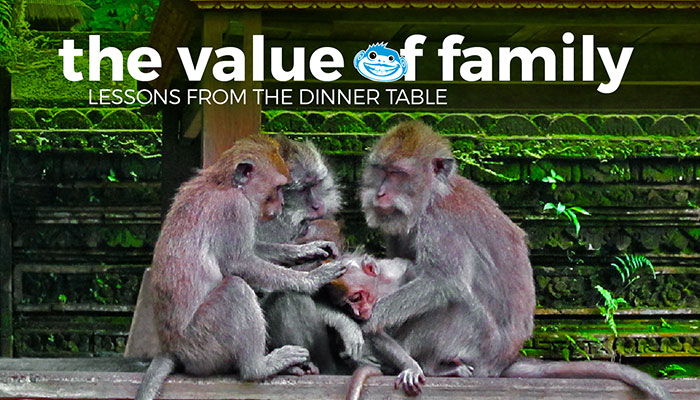 It’s funny how some memories just seem to linger, while others fade. Those that “stick” can leave lasting impressions that shape our way forward, influencing how we think or feel or act later in life.
It’s funny how some memories just seem to linger, while others fade. Those that “stick” can leave lasting impressions that shape our way forward, influencing how we think or feel or act later in life.
Some of my strongest memories center around the family dinner table when I was growing up. I couldn’t have known it then, but those daily interactions would have a strong influence on my career and business success.
BREAKING BREAD
For the June family, the dinner table was a hub of activity and conversation. Dinner was family time. It was sacred. We’d talk politics, people, social stuff, work, sports, school, etc. You name it, we talked about it!
Without fail, my Mom would always have dinner on the table at 6 pm, and if my Dad had to work late, he’d still find a way to be home for dinner at 6:00 pm, even if it meant he had to go back to work later on to finish up.
Our household was very traditional:
- We got up every day at the same time to get rolling, whether it was to go to work outside the home (my Dad) or inside (my Mom) or to go to school (my siblings and me), or to enjoy some family activity on the weekend.
- We always ate the food my Mom prepared for us, whether it was our favorite or not, and we ate leftovers—lots of leftovers!
- We helped in the yard and in the house. We did our chores—our “jobs”—whether we were asked to do them or not. We knew what was expected of us and we hung to it.
Looking back, I’d like to say we “never” complained, but that would be a stretch. It’s safe to say, though, that we rarely complained. At our house, everyone—my parents, my siblings, and me—had a job to do and for the most part did it. We knew our roles, we knew what was expected of us, and we knew our value to the “team,” to the family.
If one of us didn’t pull his or her weight, everyone would be affected, and not one of us wanted to let the others down.
- We were taught the value of the dollar.
- We were taught the value of commitment.
- We learned the value of family.
FAMILY FOUNDATION
I was the youngest of my siblings by far, which meant I got to watch all of my brothers and sisters graduate high school, go off to college, earn their degrees, and begin building their own successful careers and businesses long before I ever flew the nest. As a result, I got to see firsthand what worked or didn’t work for them, and the kind of success I might get to experience. I can even remember telling myself, “I want to do that” and “I can do that.”
But “saying” is not the same as “doing.”
One day, when I was a junior in high school, I showed my Dad my report card, which consisted mostly of “B”s and “C”s. I wasn’t overly proud of my grades, but I didn’t think they were too bad. They were average. Naturally, my Dad felt otherwise. “You’ve got brothers and sisters that can do better. So can you. You’re smart enough,” he said. “But you have to believe in yourself. Do you? You can do this. You are a June.”
Nowadays, some might consider my father’s words insensitive . . . and that’s just too bad. It’s been my experience that sometimes you need someone to be hard on you—you need someone to expect more of you than you do—so you can take that proverbial deep breath, step back, and look in the mirror.
My father was right. I could do better . . . and I did. I learned that hard work coupled with tenacity can be a tremendous boost to your self-esteem and to your success.
Growing up, my family provided a tremendous foundation for me. Because I was youngest, my brothers and sisters provided a ready-made support group of confidantes and resources. My parents instilled certain values and morals in all of us kids, and through our daily interactions, we learned that no matter what, with such a strong family foundation you always have someone you can turn to for support and guidance. I couldn’t have done what I’ve done personally or professionally without that foundation in place to steer me.
LESSONS LEARNED
- My family taught me that communication is critical to success. If you can’t communicate, you won’t get far in life or in business. It’s that simple.
- Providing a regular forum that people can count on and where everyone can speak openly—for my family it was the dinner table, for your business it might be a weekly meeting or online chat room—is critical to being heard and getting buy in to the family/business mission.
- Everyone on the team has an important role to play. In a family, whether you’re the mom or dad, or the youngest child, you are important. Roles may differ, but everyone can contribute value, and everyone should be expected to. It’s the same in business. From the CEO to front line staff, it takes a team to make an organization successful.
- Expectations must be established and articulated. When there are no expectations set or communicated—whether you’re talking about families or Fortune 100 companies—you get exactly what you “expect” to get . . . nothing, or worse yet, lots of dysfunction.
- There ain’t no such thing as a free lunch; hard work pays off; if at first you don’t succeed; fail fast; learn from your mistakes—I could go on with the clichés, but you get the picture. There’s no substitute for hard work, and there’s no dishonor in trying your best.
How have important figures from your childhood—your parents, siblings, teachers, mentors—influenced the way you conduct yourself personally or professionally?
Share your lessons learned here.
Paul June is King Monkey of BARREL O’MONKEYZ, a full-service digital media and marketing group specializing in more creativity, ideas, and fun for active lifestyle consumer products, sports marketing, and brands in San Diego and Southern California.
